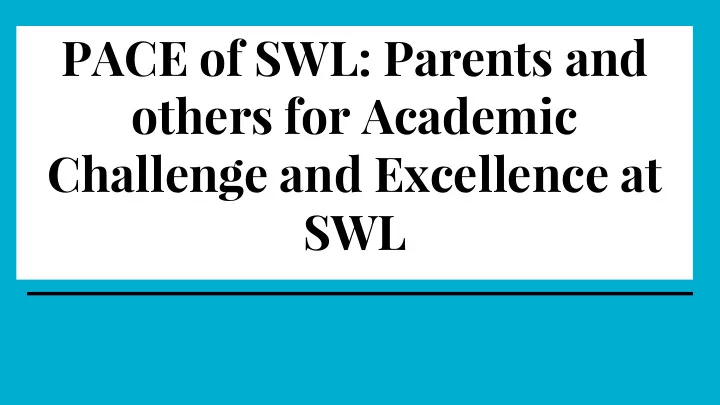

PACE of SWL: Parents and others for Academic Challenge and Excellence at SWL
PACE of S.W.L. is an affiliate group of OAGC (the state gifted advocacy group) and Southwest Licking Schools
Gifted Services 2016 - 2017 Southwest Licking Schools
Ohio Rule Regarding Gifted Services and Identification
Ohio’s Definition of Gifted "Gifted" means students who perform or show potential for performing at remarkably high levels of accomplishment when compared to others of their age, experience, or environment and who are identified
Areas Ohio recognizes as gifted: Superior Cognitive Ability Specific Academic Ability: Math, Science, Social Studies, Reading/Writing/Combination Creative Thinking Ability Visual and Performing Arts Ability
Gifted Identification Testing: State approves the tools we can use for identification. We currently use these assessments on a whole group basis. We also use additional tools on an individual or small group basis. MAP Testing: Reading and Math ONLY In-View: Superior Cognitive ability grades 2 and 5 ACT and SAT: student’s choice to take
General guideline of score needed to be identified gifted: Gifted students score in the top 95% on standardized test and talented students score in the top 85%.
State Requirements: State requires the district to IDENTIFY gifted students, but it DOES NOT mandate service. However, once a district OFFERS service, then we must follow the guidelines set by the state such as placement, class size, and instruction.
Instruction: Gifted instruction must differ in the depth, breadth, and pace of instruction differentiated based on the student's area(s) of identification and individual needs. Students can be served by teachers who are not gifted specialists as long as they have ongoing highly qualified professional development and support in providing instruction for gifted students.
WEP’s: For any instructional placement that the district counts as service (see Ohio Rule above), each student must have a written education plan that is unique to his or her needs in the instructional placement.
Services for the 2015 - 2016 Individual: Early Entrance Kindergarten and other acceleration options Group: 3rd, 4th, and 5th grade reading for an 1 ½ each day 6th and 7th grade reading Honors 7 and 8 math, science, and social studies if gifted students showed recent achievement scores and teacher recommendation Honors, AP, and dual enrollment classes for grades 6 - 12 if gifted students chose to take them and parent permission not needed to opt out had only limited professional development 9th grade gifted honors High school mentoring 12
Terms to Know GIS: Gifted Intervention Specialist Advance class: Class of only gifted students who are identified superior cognitive or in two tiers above average with a gifted identification in the subject area Enrichment class: Class of gifted students with one or more areas of identification and if room allows talented students are added Cluster group: Students with one gifted identification grouped together in a regular classroom
Growth Mindset Carol S. Zweck Individuals with a fixed mindset believe that their intelligence is simply an inborn trait—they have a certain amount, and that's that. In contrast, individuals with a growth mindset believe that they can develop their intelligence over time If you want an introduction into growth mindset in schools, watch this ten minute video: https://www.youtube.com/watch?v=Yl9TVbAal5s
Kindergarten and 1 Data driven instruction First grade 2 Engagement in learning 3 Early identification 4 Fostering Growth mindsets
Kindergarten and First Grade Gifted Services Early Entrance Enrichment 1st Kindergarten Grade Classroom 16
Second and Third Grades 1 Data driven decisions 2 Enrichment opportunities 3 Implementing gifted instruction 4 Fostering Growth mindsets
Second and Third Grade Gifted Services 2nd and 3rd 2nd and 3rd 3rd grade grade grade clusters advanced class enrichment taught by a GIS classes
Partnership Between You and the School Here are some tips for a successful discussion. 1. Make a list of concerns, items to discuss, and questions 2. Talk to your child 3. Put together a portfolio of your child's work 4. Set up an appointment/email is not a good choice for detailed concerns 5. Keep a positive attitude 6. Avoid the words "Bored" and "Gifted" 7. Keep the focus on your child 8. Review data for your child and ask questions 9. Ask what you can do to support your child’s learning at home 10. Ask for clarifications, agree on a plan with a time to check-in
Growth Mindset Introduction to Growth Mindset During Meeting Further Explanation of Growth Mindset--Highly Recommend You Watch Another Great Video on Growth Mindset Why Struggles and Mistakes Matter Greatly
Recommend
More recommend